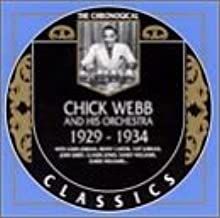
Daily Dose Of Jazz…
Wayman Carver was born on December 25, 1905 in Portsmouth, Virginia and was one of the earliest flute soloists to perform jazz. He was one of very few jazz flautists active in the swing era and his first professional experience was with J. Neal Montgomery.
After he moved to New York City in 1931, he recorded in the early Thirties with Dave Nelson, and played with Elmer Snowden, Benny Carter, and Spike Hughes.
From 1934 to 1939 he played with Chick Webb on both alto saxophone and flute. After Webb died he continued in the orchestra during its period of leadership under Ella Fitzgerald until 1941.
>After leaving the jazz scene he became a professor of music at Clark College, where he taught saxophonists George Adams and Marion Brown, among others. Flutist and alto saxophonist Wayman Carver passed away on May 6, 1967 in Atlanta, Georgia.
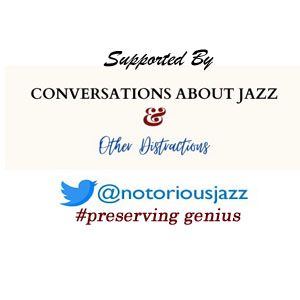
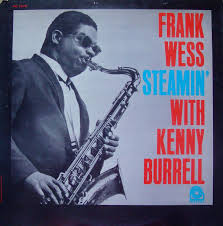
Requisites
I begin this morning’s discussion with a 1963 reissue of an album originally released in 1957 titled After Hours (Prestige 7118), one of the label’s excellent jam session records. Steamin’ (Prestige PRST 7278) features an all-star group led by Frank Wess on flute, tenor sax, and Kenny Burrell on guitar. Joining them are Thad Jones on trumpet, Mal Waldron on piano, Paul Chambers on bass, and Art Taylor on drums. Waldron composed all four tunes on the album, and my copy used for this report is the 1963 Mono reissue (Prestige PRLP 7278).
Steamin’ begins Side One with a swinging introduction by Art. Both horns present the melody in unison with Thad on the muted trumpet. Frank opens with an aggressive performance, then Kenny takes over for a hard-swinging reading. Thad creates a volcanic eruption on the third interpretation, and Frank takes a second solo, this time on flute and at breakneck speed. Wess and Jones take a few spirited riffs before Walton zips through the next reading. Taylor punctuates the final statement with a stinging bite in a momentary spotlight before the ensemble takes the song out quickly.
Blue Jelly begins at a laid-back pace, gradually ascending to midtempo as the sextet states the opening chorus. Jones solos first, his ideas flowing freely to a slowly unfolding beat. Thad, Kenny, and Frank (on flute) exchange short riffs, then Burrell settles into a comfortable tempo for the second solo. The three instruments repeat, then Wess serves up a stylish dish of blues. Walton follows the next exchange with a very satisfying statement. Chambers speaks easily on the finale with great skill ahead of the close. Count One opens Side Two and the sextet gets right to work with a lightly swinging introduction by Cedar. Thad and Frank wail on the melody and everyone gets solo space except Art who keeps things in check with a driving backbeat. Frank begins the opening statement with skillful dexterity, and Thad soars on the second solo with a riveting presence. Kenny engages the ear delightfully on the next reading, then Cedar continues the bopping beat with an insistent swing. Paul accentuates the final interpretation with two short verses that are flawless.
The album closes with a trip down an Empty Street at a slow, easy tempo opening with a wistful introduction in unison. Jones leads the opening march on the muted trumpet, and the first solo by Burrell is superbly interpreted with a soothing timbre and sensitivity. Wess follows on flute with a thoughtfully pleasant reading that’s one of the most beautiful moments on the album. Jones sounds each note of the next performance tenderly and with the utmost clarity. Walton comes in next with a dreamlike, poignant presentation of sensual beauty, and Chambers wraps up the record with a rather beautiful and deeply moving interpretation before the sextet reassembles for the reprise and coda. Although, Steamin’ is credited to Frank Wess and Kenny Burrell, this album and its original title After Hours should have been released under Mal Waldron’s name in my opinion. His spirit pervades these four tunes with incredible passion and perfect pacing in his playing, complemented by the rhythmic energy and consummate musicianship of his bandmates.
That issue aside, Steamin’ serves as an excellent starting point for those who are just discovering the music of Mal Waldron or the other albums by the group who was also known as The Prestige All-Stars. The album has a brilliant soundstage across the highs, midrange, and low end that places you in the studio alongside the musicians as they’re playing. If you’re a fan of Hard-Bop and enjoy a good jam session, I invite you to audition Steamin’ by Frank Wess with Kenny Burrell or After Hours by The Prestige All-Stars. Either version should make a welcome addition to any fan’s library!
© 2020 by Edward Thomas Carter
More Posts: choice,classic,collectible,collector,flute,history,instrumental,jazz,music,saxophone
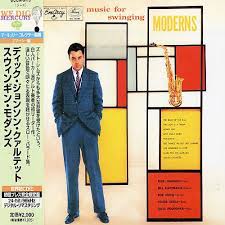
Daily Dose Of Jazz…
Dick Johnson was born Richard Brown Johnson on December 1, 1925 in Brockton, Massachusetts. His primary instrument was clarinet, however, he also played the alto saxophone and flute.
He began his professional career as a musician while serving in the U.S. Navy in 1944-1946 and played with the navy band on the USS Pasadena during World War II. He often credited his stint in the Navy for kicking off his career in jazz. After the war, Johnson toured with the big bands of Charlie Spivak and Buddy Morrow.
Eventually, after several years on the road, he settled in his hometown of Brockton, Mass. It was there in Brockton where he and his close friend, Lou Colombo formed a jazz sextet. The group lasted 10 years, but the friendship and musical kinship lasted for the rest of his life. In addition, Dick formed his septet, Swing Shift, which was a staple on the Boston music scene for many years.
Like Herb Pomeroy, Johnson managed a double career as a performer and an educator, teaching jazz at nearby Berklee School of Music, where he mentored many younger jazz musicians.
Between 1956 and 2006 he recorded ten albums as a leader. He worked with Frank Sinatra, the Swing Shift Orchestra, Dizzy Gillespie, and Tony Bennett.
Clarinetist, alto saxophonist, and flutist Dick Johnson, who also played in the free jazz genre, passed away on January 10, 2010 in Boston, Massachusetts after a short illness, aged 84.
 </ahref=”http:>
</ahref=”http:>
More Posts: bandleader,clarinet,educator,flute,history,instrumental,jazz,music,saxophone
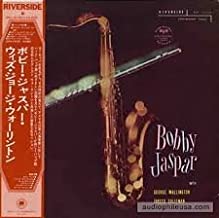
Requisites
Tenor and Flute ~ Bobby Jaspar | By Eddie Carter
Bobby Jaspar steps into the spotlight for this morning’s discussion with his 1957 album, Tenor and Flute (Riverside RLP 12-240). I first heard him on two records he made with Herbie Mann, Flute Flight, and Flute Soufflé (1957). Bobby was born in Liège, Belgium, and began playing the piano at eleven and the clarinet at sixteen. He later switched to the flute and tenor saxophone, and in 1950 began working with French pianists Henri Renaud and Bernard Peiffer. Jaspar was also a member of the Bop Shops band and played and recorded with Toshiko Akiyoshi, Chet Baker, Kenny Burrell, Donald Byrd, John Coltrane, Miles Davis, Milt Jackson, J.J. Johnson, Hank Jones, John Rae, and Wynton Kelly. He was married to jazz pianist and singer Blossom Dearie. His supporting cast is Idrees Sulieman on trumpet (tracks: A1, B1, B2), George Wallington on piano, Wilbur Little on bass, and Elvin Jones on drums. My copy used in this report is the 1976 Japanese Mono reissue (Riverside SMJ-6156M).
The opener, Seven Up is Bobby’s easy blowing vehicle beginning with everyone laid-back on the melody. Idrees starts the song in a nice happy mood on the first interpretation, then Bobby takes over for an outstanding solo as solid as the Rock of Gibraltar. George follows with some carefree cruising that’s a treat for the ears and Wilbur is rhythmically infectious on a short statement ahead of the ensemble’s breezy climax.
Jaspar changes to flute for My Old Flame, written in 1934 by Arthur Johnston and Sam Coslow. It appeared in the film, Belle of The Nineties that year. He embraces the jazz standard lovingly on the melody and paints a compassionate portrait on the opening statement. The second presentation by Wallington is tenderly expressed, then the leader gives a second performance that’s delicately pretty and Jones offers some beautifully shaped brushwork on the closer ahead of a tranquil ending.
Bobby returns to tenor sax for a spirited quartet rendition of All of You, Cole Porter’s 1954 jazz standard that first appeared in the 1955 Broadway musical, and 1957 film, Silk Stockings. The quartet gives a lift to this timeless classic with a briskly paced theme treatment. The saxophonist displays a lively intensity on the lead solo, then George adds a bouncy effervescence to the second reading. Wilbur and Elvin split the third statement for a short, incisive comment, followed by Bobby and Elvin who guide us into the reprise with an expressive exchange. Idrees Sulieman’s Doublemint is an energetic companion to his blues, Juicy Fruit, heard on The Hawk Flies High (1957). It opens Side Two with a collective infectious melody. Jaspar cooks vivaciously on the first statement, then Sulieman breaks into a robust reading. Wallington moves in next for a scintillating solo and Jones finds something good to say on the closing chorus sharing notes with the front line.
George Wallington wrote the final two tunes on Tenor and Flute beginning with his tenderly passionate ballad, Before Dawn. It starts slowly with a breathtakingly beautiful theme by Bobby and the rhythm section. Jaspar then creates a mood of ecstasy on the first performance, then Idrees delivers a fine solo punctuated with delicate lyricism. George follows, sharing a brief moment of intimacy before Bobby adds a few additional affectionate remarks preceding the ensemble’s sultry coda.
Jaspar and the rhythm section take Sweet Blanche for a brisk ride on the finale with the leader back on flute. The quartet opens with a cheerfully pleasant theme and Jaspar excels with vigorous flair on the first interpretation. Wallington heads into the second reading expressing considerable delight, then Jaspar and Jones take us home sparring with each other into a satisfying climax. Tenor and Flute was produced by Orrin Keepnews, and the man behind the dials was Jack Higgins.
I was pleasantly surprised with the sound quality, the instruments produce an exceptional soundstage across the highs, midrange, and low end that’s right on the money. The analog Mono transfer by Victor Musical Industries from the original tapes has been gorgeously remastered and transports the listener to the studio alongside the musicians during the session. During 1961 & 1962, Jaspar formed a quintet with guitarist René Thomas and performed in a series of concerts and several recordings including appearing on Chet Is Back (1962). He passed away from a heart attack at age thirty-seven on February 28, 1963. I’ve enjoyed listening to this album and am happy to have it in my library. If you aren’t familiar with Bobby Jaspar, are a fan of Hard-Bop or tenor sax, I hope you’ll seek Tenor and Flute out during your next vinyl hunt. It’s a perfect album to get into jazz and the music is sure to make you tap your foot!
~ Chet Is Back (RCA Victor PML-10307); Flute Flight (Prestige PRLP 7124); Flute Soufflé (Prestige PRLP 7101); The Hawk Flies High (Riverside RLP 12-233) – Source: Discogs.com
~ My Old Flame ~ Source: JazzStandards.com ~ All of You, Bobby Jaspar ~ Source: Wikipedia.org © 2020 by Edward Thomas Carter
More Posts: choice,classic,collectible,collector,flute,history,instrumental,jazz,music,saxophone
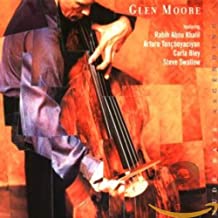
Daily Dose Of Jazz…
Glen Moore, born October 28, 1941 in Portland, Oregon started his performing career began at age 14 with the Young Oregonians in Portland. It was at this time where he met and played with Native American saxophonist, Jim Pepper.
Graduating with a degree in History and Literature from the University of Oregon, his formal bass instruction started after college with Jerome Magil in his hometown, James Harnett in Seattle, Washington, Gary Karr in New York City, Plough Christenson in Copenhagen, Denmark, Ludwig Streicher in Vienna, Austria, and Francois Rabbath in Hawaii.
Moore is a founding member of Oregon but worked also regularly with Rabih Abou-Khalil, Vasant Rai, Nancy King, and Larry Kar. For the past 30 years, has played a Klotz bass fiddle crafted in Tyrol circa 1715 on which he has made extensive use of a unique tuning with both a low and high C string. He has recorded ten albums as a leader, twenty~eight with Oregon, and twenty as a sideman. Double bassist Glen Moore, who also plays piano, flute, and violin continues to perform and record.
More Posts: bandleader,bass,flute,history,instrumental,jazz,music,piano,violin


